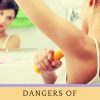 Styrofoam cups – It’s not biodegradable. Use reusable mugs or paper cups instead.
Styrofoam cups – It’s not biodegradable. Use reusable mugs or paper cups instead.
Paper towels – A waste of forest resources, landfill space, and your money. Buy dishtowels or rags to wash and reuse
Bleached coffee filters – Dioxins, chemicals formed during the chlorine bleaching process, contaminate groundwater and air and are linked to cancer in humans and animals. Use unbleached instead.
Overpackaged foods and other products – Excess packaging wastes resources and costs you much more.
Teak and mahogany – Every year, 27 million acres of tropical rainforest (an area the size of Ohio) are destroyed.
Chemical pesticides and herbicides – American households use 80 million pounds of pesticides each year.
Conventional household cleaners – Household products can contain hazardous ingredients such as organic solvents and petroleum-based chemicals that can release volatile organic compounds (VOCs) into your indoor environment, positing a particular danger for children.
Higher octane gas than you need – Only one car in ten manufactured since 1982 requires high-octane gasoline.
Toys made with PVC plastic – 70% of PVC is used in construction, but it is also found in everyday plastics, including some childrens toys. Vinyl chloride, the chemical used to make PVC, is a known human carcinogen. Buy wood toys instead.
Plastic forks and spoons – Disposable plastic utensils are not biodegradeable and not recyclable in most areas.


